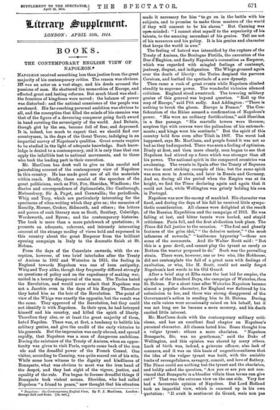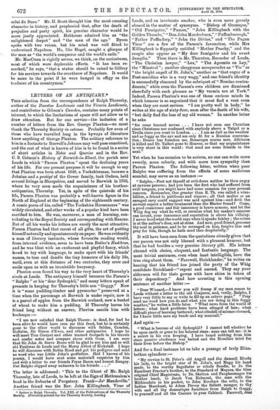BOOKS.
THE CONTEMPORARY ENGLISH VIEW OF NAPOLEON.*
NAPOLEON received something less than justice from the great majority of his contemporary critics. The reason was obvious. HI was an actor on a vast stage, and his deeds aroused the passions of men. He shattered the monarchies of Europe, and effected great and lasting reforms. But much blood was shed : the frontiers of kingdoms were moved : the balance of power was disturbed and the national conscience of the people was awakened. His far-reaching personal ambition was obvious to all, and the conception that filled the minds of his enemies was that of the figure of a devouring conqueror going forth sword in hand coveting the sovereignty of the world. And Britain, though girt by the sea, became full of fear, and depressed. It is, indeed, too much to expect that we should find our countrymen, in the days of the Great Terror, indulging in an impartial survey of Napoleon's qualities. Great events require to be studied in the light of adequate knowledge. Such know- ledge is denied to a contemporary, and it is only time that can apply the infallible test to national movements, and to those who took the leading part in their execution.
Mr. MacCuun has donb well to give us this careful and painstaking account of the contemporary view of Napoleon in this country. He has made good use of all the materials within reach. Briefly, these consist of the speeches of the great politicians, such as Pitt, Fox, Sheridan, Windham; the diaries and correspondence of diplomatists, like Castlereagh, Malmesbury, Sir A. Paget, and Cornwallis; the periodicals, Whig and Tory, which are particularly interesting for the specimens of ultra-writing which they give us; the memoirs of Hominy, Horner, Croker, Sidmouth, and others ; the letters and poems of such literary men as Scott, Southey, Coleridge, Wordsworth, and Byron; and the contemporary histories. The book is more than a mere patchwork of quotations; it presents an adequate, coherent, and intensely interesting account of the strange medley of views held and expressed in this country about the great Emperor from the brilliant opening campaign in Italy to the dramatic finish at St. Helena.
From the days of the Consulate onwards, with the ex- ception, however, of two brief interludes after the Treaty of Amiens in 1802 and Waterloo in 1815, the feeling in England towards Napoleon was one of keen antipathy. Whig and Tory alike, though they frequently differed strongly on questions of policy and on the expediency of making war, united in a hearty disapproval of the man. The Tories hated the Revolution, and would never admit that Napoleon was not a Jacobin even in the days of his Empire. Therefore they hated him as the heir of the Revolution. The point of view of the Whigs was exactly the opposite, but the result was the same. They approved of the Revolution, but they could not identify it with Napoleon. In their eyes, he had betrayed himself and his country, and killed the spirit of liberty. Therefore they also, or at least the great majority of them, hated Napolen. There was, at first, a tendency to belittle his military genius, and give the credit of the early victories to his generals. But the impression was early abroad, and spread rapidly, that Napoleon was a man of dangerous ambitions. During the existence of the Treaty of Amiens, when an oppor- tunity was given to visit Paris, reports came back of the iron mle and the dreadful power of the French Consul. One visitor, according to Canning, was quite scared out of his wits. While some bore witness to the dignity and kindliness of Bonaparte, what was obvious to most was the iron hand of the despot, and they lost sight of the vigour, justice, and equality of the rule. Fox began to foresee dreadful things if Bonaparte took violent means. Sheridan, who had called Napoleon "a friend to peace," now thought that his situation
• Napoleon: the Contemporary English View. By F. .T. NacCunn. London George Bell and Sone. [5e. net.]
made it necessary for him "to go on in the battle with his subjects, and to promise to make them masters of the world if they will consent to be his slaves." But Canning was open-minded: "I cannot shut myself to the superiority of his talents, to the amazing ascendant of his genius. Tell me not of his measures and his policy. It is his genius and character that keeps the world in awe."
The feeling of hatred was intensified by the rupture of the Treaty of Amiens, the Boulogne Flotilla, the execution of the Duo d'Enghien, and finally Napoleon's coronation as Emperor, which was regarded with mingled feelings of contempt, jealousy, disgust, and indignation. The Whigs groaned again over the death of liberty: the Tories despised the parvenu Corsican, and loathed the spectacle of a new dynasty.
Then came a rush of great events while Napoleon climbed steadily to supreme power. The wonderful victories silenced criticism. England stood awestruck. The towering military genius of this general was beyond question. " Roll up the map of Europe," said Pitt sadly. And Addington : "There is nothing to break the gloom. Europe is France." The Con- federation of the Rhine seemed a confirmation of Napoleon's power. "His were no ordinary fortifications," said Sheridan in a fine passage. "His martello towers were thrones; sceptres tipt with crowns were the palieadoes of his entrench- ments; and kings were his sentinels." But the spirit of this country held firm even after Tilsit in 1807. The worst had happened, says Mr. MacOunn, and people found it was not so bad as they had expected. There was soon a feeling of optimism. Dimly at first, and then more clearly, men began to see that Napoleon had stirred up a force which was stronger than all his power. The national spirit in the conquered countries was awakening. The events in Spain after the Treaty of Bayonne were the most striking example of this; but the same spirit was soon seen in Austria, and later in Russia and Germany. And so, during all the period when the Empire was at its height, we find the Times declaring again and again that it could not last, while Wellington was grimly holding his own in Portugal.
Napoleon was now the enemy of mankind. His character was fixed, and during the days of his fall he received little sympa- thetic consideration. All classes were delighted at the result of the Russian Expedition and the campaign of 1813. He was falling at last, and bitter taunts were hurled, and stupid criticisms. Paris fell, and the first abdication took place. The Times did full justice to the occasion. " The foul and ghastly features of the grim idol," " the delusive meteor," " the most infamous of cowards," " loathsome hypocrisy "—these are some of the comments. And Sir Walter Scott said: "But this is a poor devil, and cannot play the tyrant so rarely as Bottom the weaver proposed to do." Such was the prevailing strain. There were, however, one or two who, like Hobhouse, did not contemplate the fall of a great man with feelings of exultation, or who, like H. Scott, could not easily forget Napoleon's last words to his Old Guard.
After a brief stay at Elba came the last bid for empire, the episode of the Hundred Days, the campaign of Waterloo, then St. Helena. For a short time after Waterloo Napoleon became almost a popular character, for England was flattered by his submission to her, and there was strong disapproval of the Government's action in sending him to St. Helena. During the exile voices were occasionally raised on his behalf, but it was not long ere he became a mere memory, and his death excited little interest.
Mr. MacCunn deals with the contemporary military criti- cisms, and has an excellent final chapter on Napoleon's personal character. All classes hated him. Some thought him a vulgar tyrant: others a mere charlatan. " Napoleon Bonaparte, Sir, was no gentleman," said the Duke of Wellington, and this opinion was shared by many others. Lack of birth was, indeed, a grievous offence, also lack of manners, and it was on this basis of ungentlemanliness that the idea of the vulgar tyrant was built, with the amiable traits of revengefulness, savagery, conceit, and love of flattery. The Times could see nothing but the tyrant and the charlatan, and boldly asked the question, "Are you or are you not con- vinced that Bonaparte is a bloodier villain than terms can give out?" That was the extreme view on the one side. Very few had a favourable opinion of Napoleon. But Lord Holland took an impartial view, which is summed up in his own quotation: ",I1 avail Is sentiment du Grand, mais non pea
eelni du Beau." Mr. H. Scott thought him the most amazing character in history, and prophesied that, after the death of prejudice and party spirit, his genuine character would be more justly appreciated. Hobhouse admired him as "the enlightened despot" and "the man of the age." Byron spoke with two voices, but his mind was well fitted to understand Napoleon. He like Hegel, caught a glimpse of the man as " the world's conqueror and the world's exile."
Mr. MaoCunn is rightly severe, we think, on the caricatures, most of which were deplorable efforts. "It has been re- marked," he says, "that a statue should be raised to Gillray for his services towards the overthrow of Napoleon. It would be more to the point if he were banged in effigy as the traducer of his countrymen."



























































 Previous page
Previous page